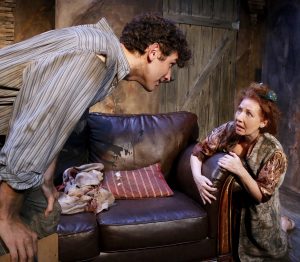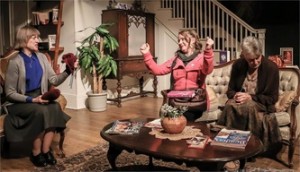It can be difficult to write a play that has both artistic and political merit, one that is dramaturgically sound and makes a political point emphatically. Often such plays succeed as agitprop, not so much as well-crafted works of theater. Abbe Tanenbaum doesn’t fall into the usual trap with her new drama What Kind of Woman: Abortion, the issue at hand, isn’t even discussed in depth until nearly halfway through the play, and the interpersonal drama is pleasant to watch unfold. Her characters and story lines could be developed more solidly, however.
Fruma-Sarah (Waiting in the Wings)
In Fruma-Sarah (Waiting in the Wings), the multitalented Jackie Hoffman portrays Ariana Russo, a barely talented amateur actor who is literally and figuratively at the end of her rope. Stuck in the minor role of the ghostly and ghastly Fruma-Sarah, in a community theater staging of Fiddler on the Roof in Roselle Park, N.J., she must spend the first “hour and seven minutes” of the show offstage, strapped in her flying harness and waiting for her cue to soar.
The Evolution of Mann
Despite the title, the lead character in The Evolution of Mann, a busy and lovelorn new musical from Douglas J. Cohen and Dan Elish, does not rise to a higher plane of existence. Rather than evolve, Henry Mann, played with his broken heart on his sleeve by Max Crumm, falls victim to his own choices as well as to the whims of those he matrimonially pursues. If, over the course of 90 minutes and a dozen songs, he ultimately finds a ray of hope, it is the females around him who elevate his consciousness, if not his likability.
Cracking Open
In Honor Molloy's Crackskull Row, a hovel in Dublin becomes the unlikely setting for an emotionally overwrought, Oedipal drama. The play is set in 1999, but it has the audience fooled—Molloy's play has all the trappings of a mid-20th-century, Joycean family narrative. Although the audience often hears references to staples of modern life—mobile phones, an ESB (Electricity Supply Board) company, even Oxfam—they sound anachronistic against this landscape of aged, mournful nostalgia. But for all its old-world charm, Molloy's riveting words don't translate perfectly to the stage. Directed by a courageous Kira Simring and staged by the cell at the Workshop Theatre, this beautifully written, hauntingly poetic story struggles to find the right tongues for its finely crafted words.

The production opens with the dour throb of a drum and that sprightly music so unique to the Irish musical tradition. An old man named Rasher/Basher, played by Colin Lane, enters, a lone figure with light streaming around him, and says that the sound we hear is "the thrum of the bodhran." It is a kind of Irish drum, well-known for its dooming, thumping sound. He talks wearily, anxiously, about his past, saying that his 'Da' was a musician, and that, although he's been away from home for 33 years, he's become the "spit and shite" of his father's likeness. A sense of foreboding takes hold, the rhythm of the bodhran notwithstanding. Then we see the ramshackle insides of a Dublin home. A vast, untidy sofa, wooden walls with peeling plaster, and a film of dirt covering the kitchen all clue us into the premise of Crackskull Row: a home has been leveled by the passage of time but seems ripe for renewed activity.
What follows is a disturbing but absorbing puzzle about Rasher Moorigan (John Charles McLaughlin), his father Basher (Lane, who also plays the older Rasher), mother Masher (Terry Donnelly) and daughter Dolly (Gina Costigan). Masher is almost literally rotting inside her electricity-less, plumbing-less home on Crackskull Row, her bills from the ESB piling up on the sofa. And while her past bothers her terribly, she is saved by the remembrance of her son, Rasher, and the sustenance of her daughter, Dolly. But it's soon apparent that the narrator, an aged Rasher, himself is unreliable, as are one's eyes and ears. Personae are fluid; the four players inhabit other bodies, take on different accents, and change their clothes easily. Suffice it to say that Rasher and Masher Moorigan are hiding a lethal, 30-year-old secret, the reverberations of which are still knocking around in their battered skulls.
There is much to admire about the production, including some fine performances from John Charles McLaughlin, who plays a young, on-edge, perversely romantic Rasher, and Gina Costigan, whose Dolly is a complex, willful thing. But their enthusiasm doesn't quite make up for the uneasy adaptation from script to stage. Crackskull Row often values dramatic potential over clarity, and while some climactic, intimate scenes (like Rasher's interactions with Dolly, or the dying moments of the play) are intensely dramatic, others fall into a spasmodic mode of meaningless activity. The result is not just an abrogation of Molloy's authorial intent for Crackskull Row, but a confusingly paced, occasionally overwrought performance.
Save for a few rare scenes of sparkling chemistry, the production threatens to come away at the seams. Molloy's dialogue is chock-full of intelligent wordplay, quick humor, and wit, but combined with the Irish brogue and quick delivery, her words (when delivered on stage) take a while to register. As a result, the enjoyment of the play is temporarily stunted. Much of the magic that can be read in Molloy's teasing, metaphorical writing is either difficult to find or nonexistent in the staging. We happen upon the wordplay, or a throwaway malapropism, a little too late to derive a complete appreciation of the story.
Yet, the production is redeemed and revived by its flowing, narrative core, and the actors who bring it to life. The chemistry between McLaughlin and Costigan is palpable; it's not for nothing that the Masher-Rasher relationship is central to the play. Lane brings a nostalgic weariness to his role, and lends a dreamy gravitas to the production. But it is Costigan who bears much of Molloy's light-hearted darkness from the page to the stage; she plays Dolly with riveting, minimalist understanding. Even her mirror, Terry Donnelly's Masher, does not waste a single movement (although words seem to be held in lower regard). To help us forget this latter discourtesy, M. Florian Staab (responsible for all the original music and sound design) punctuates scene changes with welcome percussion and fiddle-song. In moments of stillness or silence, there is Daniel Geggatt’s set to appreciate, in blue, brown and yellow, seeming for all intents and purposes like a living thing. As for the other living things taking the stage, they—and the playwright—are among the only reasons you should take a trip to the Workshop Theater this week.
The cell's production of Crackskull Row runs through Sept. 25. Evening performances are at 7 p.m. Thursday through Saturday; matinees are at 3 p.m. Saturday and Sunday. There are additional performances at 7 p.m. on Sept. 14 and 21. The Main Stage of the Workshop Theatre is at 312 West 36th St. (between Eighth and Ninth avenues). Tickets are $25. For more information about the show and tickets, visit www.thecelltheatre.org.
High on the Buy
Shoes and Baggage is a wildly entertaining one-woman show that explores shopping, and life. Written and performed by stage veteran Cheryl Stern (whose Broadway credits include La Cage aux Folles and The Women) and directed by Joe Barros, both actor and director do a marvelous job of using the cell theater, a small space that is more of a theater in the rectangle than the round. Nonetheless, all seats are good, and musical director John Dipitino’s soundtrack, performed by a two-man band with drum, keyboard and guitar, adds pizzazz and drive to the performance, but don’t overwhelm the diminutively sized actress.
Stern hits the nail on the head when she reveals her conflicted relationship to shopping. She manages a delicate balance between revealing the inner turmoil as well as the ameliorating effects of shopping during some of life’s more difficult moments. The dialogue is intimate but not, as kids today say, TMI (too much information). A self-confessed connoisseur of clothing, shoes and baggage, she recalls her experiences buying her first Louis Vuitton bag and to “buy, or not to buy” a pair of Louboutins that cost as much as her weekly paycheck.
Weaving in past experiences that go all the way back to childhood with more contemporary experiences, Stern does a fantastic job. She touches on relationships that have influenced and informed her appreciation for clothing. Two in particular are with Rena and Karen, whom she remains fast friends with in life and shopping. When Stern first meets Rena in a college acting class, she is completely taken by her. Dressed in a rabbit fur coat, Rena is “urban-sexy in a Bianca Jagger sort of way.” It turns out Rena can’t act but the two form a bond. Akin to this relationship is the one she forms with Karen while out walking her dog one day. Karen is a former Ford model and disco queen and, when they meet, the ad director of Vogue. They embark on many shopping excursions and Karen verses her in the world of couture.
Stern’s play is also an autobiographical account of her experience as an actress. She hilariously renders her experience as a cast member of The Women, a Broadway production that included Cynthia Nixon, Jennifer Tilly and Kristen Johnston. She forms an unlikely bond with Tilly, who has a great appreciation for unusual jewelry and fashion. When Stern compliments Tilly on some rings she’s wearing, she captures Tilly’s relaxed and off-the-cuff cadence with her reply: “Super-cute, right?” They become friends with an appreciation for fashion, and after one particular shopping spree, nearly miss curtain call.
It’s not only the wild forays into shopping that Stern captures, but the addictive nature of it. While trying to return a sweater at a high-end retail store, she ends up leaving with a pair of pants and a top, in addition to the sweater she initially goes in to return. When she sings: “High, totally high from the buy…,” it explains the thrill of going home with new purchases. But then, when she feels compelled to hide them in the closet so her husband won’t see them, there’s the shame in knowing that they exceed her budget, and she failed in returning a sweater that wasn’t really perfect after all.
Stern outlines the way shopping can alleviate some of the stress that occurs in life. When friends get sick with cancer, or lose their jobs, or her father is in the hospital after a heart attack, shopping and an appreciation for clothing, shoes and baggage somehow make the moments more bearable. Yet, as Stern grows older, she comes to recognize that shopping is an addiction as serious as any other. She sings “High, totally hooked on the high, take another hit, like breathing air, oh the lure of what to wear.” Through Debtors Anonymous and self-help books filled with daily affirmations she comes to terms with the fact that shopping is only a high, and not a real antidote to life’s problems. It’s uncertain how she will live without the “high of the buy,” she says, but it seems like it’s time to try and face the music of her addiction, and let that “good buy” go.
Shoes and Baggage, is playing at the cell, 338 West 23rd St. (between 8th & 9th avenues) through June 3.. Take A/C/E train to 8th Ave at 23rd Street. Evening performances are at 7 p.m., Wednesday through Sunday, with matinees at 2 p.m. on Saturday and Sunday. No late seating is permitted. Tickets are $35. For more information, call (646) 861-2253, visit www.thecelltheatre.org.
Lord Have Mercy
According to Flannery O’Connor, “the basis of art is truth, both in matter and in mode.” And the truth is in the pudding in the revival of The Savannah Disputation, a charming and thought-provoking comedy by Evan Smith produced by Me & She Productions and ManyTracks Inc., at The Cell Theatre, the beautiful artists’ rental space in Chelsea. Set at Christmas time in Georgia, it is an exploration at the battle between the righteous. It’s the Catholics versus the Protestants in Southern style.
Two unmarried prudish Catholic sisters, appropriately named Mary and Margaret (played by Lucy McMichael and Charlotte Hampden respectively) are forced to defend their faith to Melissa (played by Katie Yamulla), an overzealous Protestant cheerleader for Jesus. The situation becomes tricky when they call in the troops, Father Murphy and their parish priest (performed by Michael Gnat) to prove his valor and set the wayward Protestant straight. They all learn some humbling lessons as they try to prove that their idea of faith is right and the other is wrong. Of course, they all learn that maybe they are really on the same side after all and that maybe organized religion isn’t always the best way to save your soul.
Understanding the details of time and place is necessary to an accurate and convincing set. Sarah Edkins was spot-on with her interpretation of an old-style Southern Catholic home in Georgia. Complete with Better Homes and Gardens and Reader’s Digest on the mahogany coffee table that anyone from the South would recognize—the only missing magazine was Southern Living.
The two sisters are like the good fairies in "Sleeping Beauty" trying to figure out which color Princess Aurora’s dress should be. Both bicker and flit around their pristine cage showing their contrasting temperaments. But Melissa, the enthusiastic holy roller, is no princess. In tight leggings, hot pink valor and flip flops, Yamulla throws on all the Southern charm to sell them on Jesus. Father Murphy is the voice of reason, who in between bites of banana pudding, enlightens them all to certain decrees of Catholicism, forcing the sisters and Melissa to question their own misinterpretations of religious dogmas.
As typical with sisters, one is sweet and unsure; the other is aggressive and hot-tempered. They are true Southern ladies of biblical proportions. While Mary is ready to barricade the fort against the forces of evil that Melissa seems to represent (Protestant white trash), Margaret is much more open to listening to Melissa’s perspective. Demanding that Father Murphy set things straight, Mary is mortified when she learns that the Catholic faith also believes that earthly bodies will rise and go to Heaven—one of the many tenants that Melissa is preaching which Mary is convinced is a lie: “You Christian Delinquent!” This sets her off in a fury to denounce herself from the Catholic faith; she rails in her denial for excommunication which Father Murphy explains to her one cannot do to themselves.
Both actresses are defenders of the faith with a scent of lavender and hot sauce. Director Katrin Hilbe gives leeway for her actors to explore the emotional life of their characters with the rich dialogue created by Smith. Mary defends herself righteously with lines such as “That is the way the Lord made it’s not my fault.” Margaret, bothered and bewildered by the contractions Melissa offers: “I just want to be buried next to somebody I know.” Sweet Melissa justifies her need to convert her wayward hostesses with retorts like “Catholics are just people too when you take away their religion.” Her phone goes off randomly at perfect times in the action with the "Mission: Impossible" theme song ringtone, enhancing the dilemma she faces trying to help guide her new friends to the true way to Jesus.
The Cell Theatre is a cozy performance space that invites the audience into a realistic home environment. The set encompassed the entire space besides the round seating for the audience. A grand piano with family portraits, a Faulknerian settee, doorways off to a kitchen and backyard, and wooden cabinets full of unopened Scotch all create the mood of old school Catholic Georgia. The use of the stairway and upper floor as part of the action was also very effective. When Mary preaches down to the others in her dismay and denunciation of Catholicism, the contrast of the giant mural of El Greco's "Christ Carrying the Cross" on the stairway wall further enhances the play's themes.
After the ammo smoke settles, they all are left shell-shocked with doubts about their religion, while also realizing they have been stripped bare of the canonical veil and are left eating their own humble pie. Through Hilbe’s direction and the ensemble of designers and actors, we see a clear picture of the battle for faith in us all. While letting us laugh at a very deep issue of the dangers of dogmatic religious beliefs, Hilbe's interpretation of Smith's masterpiece leaves us all reflecting on our own belief systems and eating a bit of humble pie, too.
The Savannah Disputation is running until Dec. 20 at Nancy Manocherian's Cell Theatre (338 West 23rd St. between 8th and 9th Aves.) in Manhattan. Tickets are $18 and can be purchased by calling OvationTix at 212-352-3101 or visiting https://web.ovationtix.com/trs/pr/952841 or www.meandsheproductions.org.












